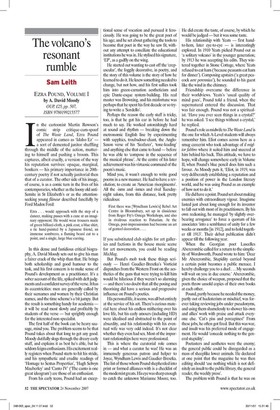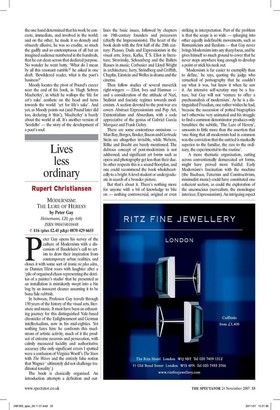The volcano's resonant rumble
Sam Leith EZRA POUND, VOLUME I by A. David Moody OUP £25, pp. 507, ISBN 9780199215577 1 n the cartoonist Martin Rowson's comic strip critique-cum-spoof of The Waste Land, Ezra Pound appeared in cameo as 'Idaho Ez' — a sort of demented janitor shuffling through the middle of the action, muttering to himself and pushing a broom. This captures, albeit cruelly, a version of the way his reputation survives: opaque, marginal, bonkers — his primary importance in 20thcentury poetry if not actually janitorial then that of a curator. The other side of his image, of course, is as a comic turn in the lives of his contemporaries, whether as the loony old antiSemite in St Elizabeth's or as the attentionseeking young flaneur described fancifully by Ford Madox Ford: Ezra . . . would approach with the step of a dancer, making passes with a cane at an imaginary opponent. He would wear trousers made of green billiard-cloth, a pink coat, a blue shirt, a tie hand-painted by a Japanese friend, an immense sombrero, a flaming beard cut to a point, and a single, large blue earring.
In this dense and fastidious critical biography, A. David Moody sets out to give his man a fairer crack of the whip than that. He brings both scholarship and good humour to the task, and his first concern is to make sense of Pound's development as a practitioner. It's a sober account of the life, spiked with deft judgments and a confident survey of the verse. It has its eccentricities: men are generally called by their surnames and women by their Christian names, and the time scheme's a bit jumpy. But the result is something handy for academia — it will be read most slowly and profitably by students of the verse — but sprightly enough for the interested non-specialist.
The first half of the book can be heavy sausage, mind you. The problem seems to be that Pound takes about that long to get any good. Moody dutifully slogs through the dreary early stuff and explains it as best he's able, but he seldom feigns enthusiasm. His excitement really registers when Pound starts to hit his stride, and his sympathetic and erudite readings of 'Homage to Sextus Propertius', 'Hugh Selwyn Mauberley' and 'Canto IV' (The canto is one great ideogram') are those of an enthusiast.
From his early teens, Pound had an exceptional sense of vocation and pursued it ferociously. He was going to be the great poet of his age; and he set about gathering the tools to become that poet in the way he saw fit, without any attempt to conciliate the educational institutions he was in. He stylised his signature, 'EP', as a gadfly on the wing.
He started out wanting to cast off the 'crepuscular', the foggily decorative, in poetry, and the story of this volume is the story of how he learned to do it. He knew something needed to change, but not how, and his first sallies took him into green-carnation aestheticism and epic Dante-esque system-building. His real master was Browning, and his misfortune was perhaps that he spent his first decade or so trying to write a `Sordello'.
Perhaps the reason the early stuff is tricky, too, is that he got his ear in before he had much to say. He worked astonishingly hard at sound and rhythm — breaking down the metronomic English line by experimenting with sapphics, troubadour-chant, the AngloSaxon verse of his 'Seafarer', lone-leading' and anything else that came to hand — before he was able to 'compose in the sequence of the musical phrase'. At the centre of his later achievement was his virtuosic command of the poem's music.
Mind you, it wasn't enough to write good poems in a new manner. He had to have a revolution; to create an 'American risorgimento'. All the -isms and -ismes and rival Tuesdaynight salons, from this distance, look pretty ridiculous: First there was [Wyndham Lewis's] Rebel Art Centre in Bloomsbury, set up in dissidence from Roger Fry's Omega Workshops, and also in rivalrous reaction to Futurism. At the Omega, post-impressionism had become an art of genteel decoration ....
If you substituted club nights for art galleries and factions in the house music scene for art movements, you could be reading MbcMag.
But Pound's mob took these things seriously — Henri Gaudier-Breszka's Vorticist dispatches from the Western Front on the aesthetics of the guns that were trying to kill him would be hilarious if they weren't so alarming — and there's no doubt that all the posing and theorising did have a serious and progressive influence on Pound's poetics.
His personal life, it seems, was all but entirely at the service of his art. There's curious material here about his endless mithering over his love life, but his early amours (including HD) were idealised and abstracted to the point of absurdity, and his relationship with his eventual wife was very odd indeed. It's not clear whether they even had sex. Most of the important relationships here were professional.
This is where the curatorial role comes in — and what a curator he was! He was an immensely generous patron and helper to Joyce, Wyndham Lewis and Gaudier-Breszka The list of those whom Pound shepherded into print or formed alliances with is a checklist of the modernist greats. His eye was sharp enough to catch the unknown Marianne Moore, too.
He did create the taste, of course, by which he would be judged — but it was some taste.
His relationship with Yeats — first handto-hem, later eye-to-eye — is interestingly explored. In 1910 Yeats picked Pound out as 'a solitary volcano' in the younger generation; by 1913 he was accepting his edits. They wintered together in Stone Cottage, where Yeats refused to eat ham (because peasants eat ham for dinner'). Composing upstairs (a great peacock acre perennius), he sounded to his guest like the wind in the chimney.
Friendship overcame the difference in their worldviews. Yeats's 'usual quality of mind goes', Pound told a friend, when the supernatural entered the discussion. That was fair enough. Pound was not a spiritualist. 'Have you ever seen things in a crystal?' he was asked. 'I see things without a crystal,' he replied.
Pound's role as midwife to The Waste Land is the one for which A-Level students will always remember him Eliot comes across here as a smug careerist who took advantage of il miglior fabbro where it suited him and sneered at him behind his back. This attitude, we have to hope, will change somewhere early in Volume II, when Pound's blue pencil does him such a favour. As Moody puts it, 'Eliot, in 1919, was very deliberately establishing a reputation and a position of power in the London literary world, and he was using Pound as an example of how not to do it.'
He did have a point. Pound set about making enemies with extraordinary vigour. Imagisme lasted just about long enough for its inventor to fall out with most of its practitioners. By his own reckoning, he managed 'by slightly overbearing arrogance' to force a quorum of his associates 'into a semblance of unity for a few weeks or months [in 19121, and to hold together till 1913'. Their debut publication didn't appear till the following year.
When the Georgian poet Lascelles Abercrombie called for a return to the simplicity of Wordsworth, Pound wrote to him. 'Dear Mr Abercrombie, Stupidity carried beyond a certain point becomes a public menace. I hereby challenge you to a duel. .. My seconds will wait on you in due course.' Abercrombie, given the choice of weapon, proposed that the poets throw unsold copies of their own books at each other.
Pound, partly because he needed the money, partly out of hucksterism or mischief was forever taking reviewing jobs under pseudonyms, and using them shamelessly to shower his own and allies' work with praise and attack everyone else. 'Cat's piss and porcupines!' From these jobs, he often got fired. But this was war, and insult was his preferred mode of engagement. He would 'concede nothing to the general stupidity'.
Poetasters and aesthetes were the enemy; the general public could be disregarded as a mass of sheeplike lower animals. He declared at one point that the magazine he was then editing should 'use nothing which is not definitely an insult to the public library, the general reader, the weekly press'.
The problem with Pound is that he was on the one hand determined that his work be concrete, immediate, and involved in the world; and on the other, he made it so densely and obsurely allusive, he was so erudite, so much the gadfly and so contemptuous of all but an imagined audience numbered in the hundreds, that he cut clean across that declared purpose. No wonder he went batty. 'What do I mean by all this resonant rumble?' he asked in one draft. 'Bewildered reader, what is the poet's business?'
Moody locates the pivot of Pound's career near the end of his book, in 'Hugh Selwyn Mauberley', in which he wallops the 'life for art's sake' aesthete on the head and turns towards the world: 'art for life's sake'. And yet, as Moody points out (and Pound later did too, declaring it 'thin), `Mauberley' is barely about the world at all. It's another version of `Sordello' — the story of the development of a poet's soul.







































































 Previous page
Previous page